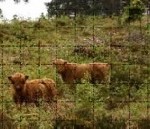 Woodland managers in Scotland are being recruited to pilot a special new forestry grant that appears to turn traditional forestry wisdom on its head.
Woodland managers in Scotland are being recruited to pilot a special new forestry grant that appears to turn traditional forestry wisdom on its head.Usually when Forestry Commission Scotland awards grants for woodland establishment or management, it insists that farm animals such as cattle and sheep are kept out of the woodland to prevent them eating and trampling young trees. But the Commission is recruiting managers of special types of land where conservation experts believe a certain level of livestock grazing can actually be good for the woodland environment. It wants a number of such places across Scotland to act as a pilot for a new grant it is planning to make widely available, probably from 2007.
Grants development officer Alex Morris explained,
"The woods we are recruiting for the pilot scheme will be those where planned and controlled grazing by domestic livestock is most likely to improve or maintain the existing or future biodiversity within their wooded ecosystems.
"The purpose of the pilot scheme is so that we can develop practical advice for managers and also accurately assess what costs are involved in this type of woodland management. Once we have this information we can produce best practice guidance, finalise the grant and make it more widely available to interested woodland managers.
"In the past, we have compensated farmers for completely excluding livestock from woodland, but this new grant will enable us to adopt a much more refined and targeted approach to livestock grazing in woodland. That's because controlled livestock grazing, especially by cattle, can help to maintain biodiversity in open, wooded ecosystems.
"Livestock can maintain non-wooded areas within woodlands, and suppress weeds. They can also encourage tree regeneration by helping to prepare the site, for example, by disturbing the soil in the autumn as seeds are about to fall.
"Some wildlife species of high conservation importance, especially butterflies such as pearl-bordered and marsh fritillaries, actually depend for their survival on grazed areas in woodland."
The pilot scheme will last between five and 10 years, depending on results. Woodland owners who take part in the pilot scheme will receive ?100 per hectare per year for the duration, in addition to 60% or 90% of Scottish Forestry Grants Scheme (SFGS) standard costs for eligible operations.
In common with most grants from the SFGS, the new Controlled Livestock Grazing in Woodland Stewardship Grant, as it will be known, will usually pay 60 per cent of the land manager's agreed costs. However it will pay 90 per cent of agreed costs for work that will benefit native woodland, Sites of Special Scientific Interest, Natura sites, woodland habitat action plans and species action plans, and scheduled ancient monuments in a woodland setting. Applications for sites already in receipt of Farmland Premium or one of its predecessors may be eligible if the Commission and the Scottish Executive's Environment & Rural Affairs Department (SEERAD) agree that significant conservation benefits will result.
Further information is available from Forestry Commission Scotland's regional Conservancy offices at Dingwall, Huntly, Perth, Clydebank (Hamilton from July 1st), Dumfries and Galashiels.
NOTES TO EDITOR:
The Scottish Forestry Grants Scheme makes a range of grants available to help land managers to plant, regenerate, manage and improve forests and woods.
The Farmland Premium and its predecessor, the Farm Woodland Premium Scheme, pay farmers an annual sum for up to 15 years in compensation for income they have given up from land that has been converted to woodland.
Forestry Commission Scotland serves as the Scottish Executive's forestry department. It supports other woodland owners with grants, felling licences, advice and regulation; manages 666,000 hectares of national forest land owned by Scottish Ministers for multiple benefits including timber production, nature conservation, public recreation, and rural and community development; promotes the benefits of forests and forestry; and advises Ministers on forestry policy.



